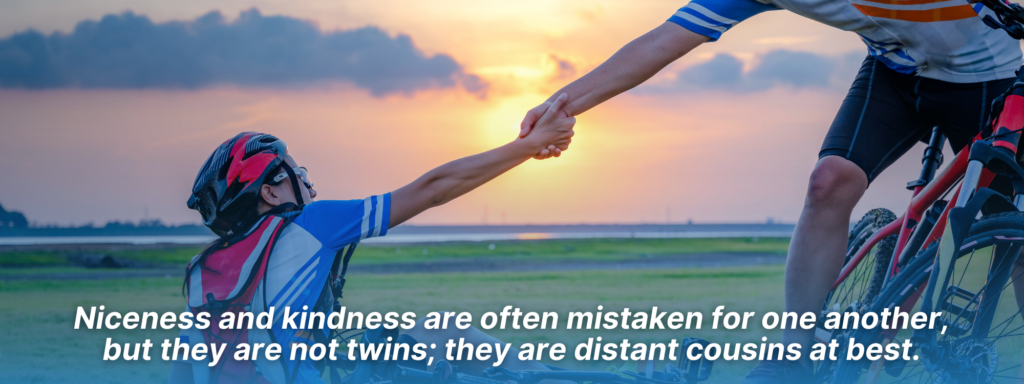There’s a peculiar kind of heartbreak that doesn’t arrive with betrayal or cruelty, but with something far more insidious: indifference. You might have experienced it yourself. At the beginning, you are treated with warmth so intense it feels like the sun breaking through winter clouds. Every word is laced with care, every gesture a quiet reassurance that you are special. Then, one day, something shifts. The warmth remains for the world to see, but for you, it grows tepid. The sparkle in their eyes is dulled when they look at you, and their affection, once boundless, is now measured in teaspoons.
At first, you search for explanations—perhaps they are stressed, distracted, lost in their own thoughts. But a deeper realisation dawns: they haven’t changed. They are just treating you as they treat everyone else. The kindness that once seemed infinite was merely a focused beam, and now that it has moved elsewhere, you see them clearly. You were never basking in the glow of a truly kind person—you were standing in the spotlight of someone who was nice to you. And now, the light has shifted.
This is where people falter. They try to win back what was lost, believing that if they behave differently—love harder, talk softer, hold on tighter—they can reignite the warmth. But they misunderstand the nature of what they’ve lost. Niceness is a flickering flame, dependent on conditions. Kindness, by contrast, is an ever-burning fire. The difference is everything.
Once the initial sting of fading warmth subsides, a question emerges: Was it real? This is the moment where many people slip into a dangerous loop of self-doubt. Did they misinterpret everything? Were they naïve to believe in the tenderness they once received? Or, worse, did they do something to make it disappear? These questions betray a fundamental misunderstanding—not of relationships, but of human nature.

Niceness and Kindness
Niceness and kindness are often mistaken for one another, but they are not twins; they are distant cousins at best. Niceness is a social performance, a well-rehearsed script designed to achieve a desired effect. It is adaptive, flexible, and often strategic. Nice people smile because it oils the gears of interaction, making them likeable, agreeable, non-threatening. There is nothing inherently wrong with niceness, but there is something deeply unreliable about it. It is dependent on context, shaped by incentives, and, crucially, it is selective. A nice person is nice to whom they choose to be nice. And when their choice changes, so does their behaviour.
Kindness, by contrast, is not a mask but a character trait. It is an unthinking instinct, the baseline of a person’s moral universe. A kind person does not adjust their treatment of others based on attraction, status, or personal gain. They do not reserve warmth for those they admire while offering indifference or coldness to those they deem irrelevant. Kindness is stable, niceness is conditional. That distinction is not trivial—it is the difference between someone who will hold your hand through the storms of life and someone who will simply not be unpleasant when the weather is fair.
This is why mistaking niceness for kindness can be catastrophic in love. If someone is only kind to you but dismissive, impatient, or indifferent to others, their kindness is not kindness at all—it is niceness with a target. And what happens when you are no longer the target? The treatment you once received will vanish, and in its place, you will find what was always there: a person who only ever acts in ways that serve them.

Niceness with a Target
Emma had always believed that kindness was the foundation of love. It was what separated deep, enduring connection from the fleeting infatuations that burned hot and died fast. So when she met Jamie, she felt sure she had found something rare. Jamie was attentive in a way that felt effortless, thoughtful without prompting. He noticed the little things: how Emma liked her coffee, the way her voice softened when she was tired, the slight hesitation before she spoke when something was on her mind.
But there was something else, something Emma couldn’t quite put their finger on. Jamie was charming, unquestionably, but there was a sharpness to his interactions with others. A dismissive wave of the hand at a waiter who took too long, an impatient sigh at the barista who misheard an order, a cool indifference towards a friend who had fallen out of favour. It was subtle at first, and easy to justify—they’re just having a bad day, he’s tired, he doesn’t suffer fools gladly.
Then, one day, the warmth dimmed. Nothing dramatic, nothing cruel. Just a shift—subtle but undeniable. The small kindnesses, once abundant, became scarce. The laughter that had been so easy now seemed measured, rationed. Emma searched for an explanation, but deep down, she already knew. She had seen how Jamie treated others. She had simply never been on the receiving end of it—until now.
The realisation hit like a cold wind. The kindness had never been kindness at all. It had been niceness—temporary, selective, and ultimately, contingent on attraction. Jamie had never been the sort of person who cared for others innately. He simply extended his warmth when it suited him.
This is where so many people falter. They believe that the fading warmth is a problem to be solved, a puzzle to be pieced back together. But the truth is simpler and harsher: Nothing has changed except where you stand in their hierarchy of importance. You are no longer the focal point of their niceness, and because niceness is all they ever had to give, you are now receiving what was always beneath it—indifference.
Emma didn’t beg for Jamie’s attention to return. She simply stepped back, watched, and understood.

Kindness is Free
The hardest lesson is not that some people withdraw their warmth—it’s that the warmth was never real to begin with. The great illusion of selective niceness is that it feels like a reflection of your worth. When someone lavishes you with attention and tenderness, it is easy to believe that you have earned their kindness. But true kindness does not need to be earned. It is given freely, not as a reward, but as an expression of who a person is.
So how do you know if someone is truly kind? The answer is simple: watch them when they have nothing to gain. Kind people are kind to everyone—not just to the ones they find attractive, useful, or impressive. They extend their consideration to waiters, cashiers, strangers in passing. They are not performative about it; they do not need an audience to be decent. Their kindness is a quiet, consistent hum, not an on-off switch flicked according to circumstance.
Here’s the real test: if someone is only kind to you, they’re not kind at all. That warmth is not kindness—it is niceness on a leash, tethered to their feelings for you. And if their attraction fades, if their interest wanes, that leash will snap. You will be left standing in the cold, wondering where the warmth went.
But it was never the warmth of a real fire. It was an LED glow—cold, bright and lifeless—shining in your direction for a time.
True kindness is the fire itself. Find someone who carries it within them, and you will never be left in the cold.



